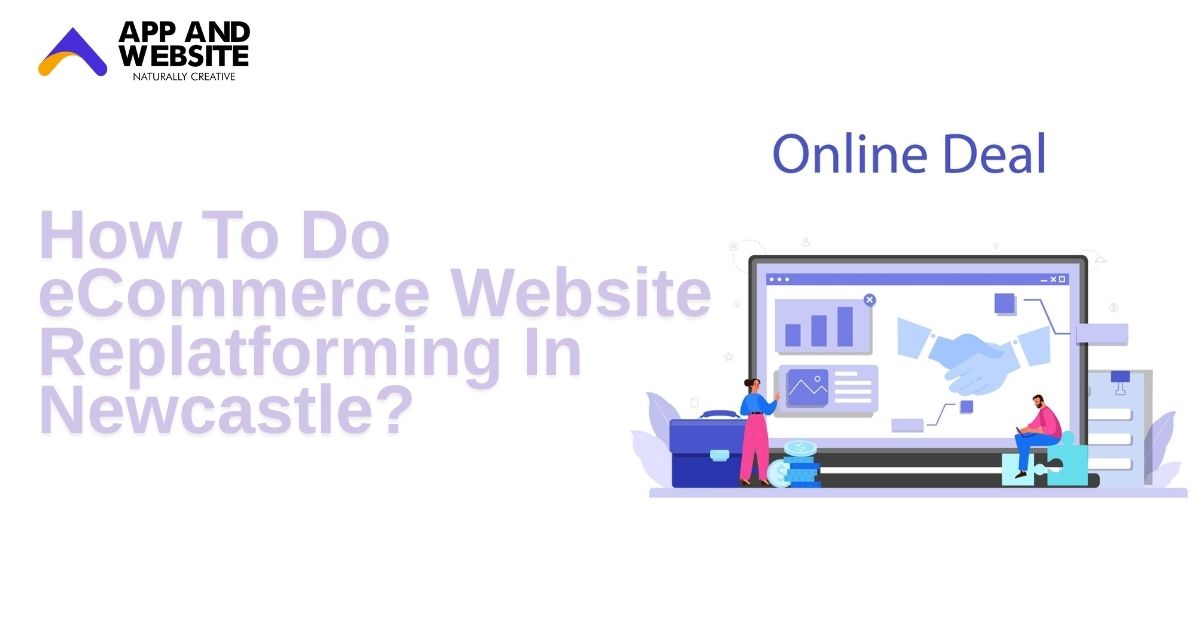In the dynamic world of eCommerce, your platform’s performance can make or break your business. With ever-changing technology, customer expectations, and market competition, keeping your eCommerce site up-to-date is crucial. This is especially true for businesses in bustling cities like Newcastle, where the competitive edge is important to stay ahead.
Replatforming an eCommerce website can seem like a daunting task, but it is necessary when the current platform no longer meets your needs. Whether it’s for performance, scalability, or user experience, replatforming can unlock new potential for your online store. It can boost sales, improve customer satisfaction, and give your brand a competitive advantage.
This blog will explore the critical aspects of eCommerce website replatforming, focusing on Newcastle businesses. We will explain what replatforming is, why it is different from migration, and the key benefits. Additionally, we will dive into important factors to consider, common challenges, and how expert help can simplify the process. Whether you’re planning a migration or replatforming, this guide will offer valuable insights to help you make informed decisions for your eCommerce business.
What Is eCommerce Website Replatforming? How It’s Different from Migration?
eCommerce website replatforming refers to the process of moving your online store from one platform to another. Unlike a simple migration, where data is transferred from one platform to another without changing much, replatforming often involves a more comprehensive overhaul. This can include changing core functionalities, adopting new technologies, and making customizations that weren’t possible on your previous platform.
Replatforming is often necessary when an eCommerce business outgrows its current platform or finds that its platform no longer supports its needs, either because of technological limitations or operational inefficiencies. It’s about adopting a new infrastructure to support the business more effectively.
In contrast, migration is simply about moving data, products, and customer information from one system to another. While migration might sound like an easier process, it often doesn’t address performance or functionality problems that could be resolved by replatforming. Replatforming is a more involved but rewarding process for businesses looking to improve their scalability, user experience, and backend capabilities.
eCommerce Replatforming and Migration – Different or Same?
While many use the terms interchangeably, eCommerce replatforming and migration are fundamentally different in scope and execution. Migration refers to the transfer of data from one platform to another, while replatforming involves upgrading the entire infrastructure.
Migration might be ideal for businesses that need to shift data without changing the core system. It is usually simpler, quicker, and less expensive. Replatforming, however, includes the migration of data, but also improves the technology stack, introduces new features, and enhances overall business processes.
Replatforming is a more complex task, involving redesigning workflows, introducing new integrations, and in some cases, even changing how your business operates. For Newcastle-based businesses looking for long-term scalability and performance, replatforming may be the better choice compared to basic migration.
eCommerce Website Site Migration Stats
Understanding the statistics behind eCommerce replatforming and migration can help clarify its importance. Recent studies show that:
- Over 60% of businesses plan to replatform within the next two years due to scalability issues.
- Companies report a 20% average increase in page load speed post-replatforming.
- Around 45% of businesses experience lower operational costs after successfully replatforming.
- Customer satisfaction improves by 30% on average after a replatforming project is completed.
- 75% of companies that replatform experience a reduction in cart abandonment.
These stats highlight the significant benefits that eCommerce replatforming can offer, especially in terms of performance, user experience, and cost savings.
What Is The Need For eCommerce Website Replatforming In Newcastle?
Newcastle is a growing hub for businesses of all sizes, from retail to service-based enterprises. As the city’s digital landscape evolves, eCommerce businesses must stay competitive by offering high-quality online experiences. Many older eCommerce platforms in use today are not equipped to handle the demands of modern shoppers, who expect fast loading times, seamless navigation, and personalized experiences.
Moreover, the Newcastle market is competitive, and businesses that lag behind in technology may find it difficult to attract and retain customers. Replatforming is crucial for staying ahead, improving operational efficiency, and scaling your business to meet the increasing demands of the online marketplace.
The need for eCommerce website replatforming arises when your current platform starts limiting your ability to grow. Whether it’s due to performance issues, a lack of customization, or the inability to integrate with new technologies, replatforming can provide the solution Newcastle businesses need to thrive in the digital age.
Benefits Of eCommerce Website Replatforming in Newcastle
Replatforming can revolutionize your eCommerce website, bringing both operational and customer-facing benefits. Here are the key benefits:
1. Enhanced Performance: By adopting a modern platform, you can reduce page load times, improve server response, and ensure your website performs well even under heavy traffic. This is essential for improving user experience and boosting conversions.
2. Better Scalability: Replatforming allows your business to grow without the limitations of your old system. You can add more products, integrate with advanced systems, and expand to new markets effortlessly.
3. Advanced Features and Integrations: New platforms offer a wide range of integrations and features, including improved payment gateways, advanced analytics, and better marketing tools.
4. Improved Security: Many legacy platforms have security vulnerabilities. Replatforming to a more modern system ensures you have better protection against cyber threats and ensures compliance with the latest security protocols.
5. Cost Efficiency: While replatforming may seem expensive upfront, it often reduces long-term costs by streamlining operations, automating tasks, and reducing the need for manual interventions.
When To Replatform Your eCommerce Website in Newcastle
Identifying the right time to replatform is crucial for minimizing risks and maximizing the benefits of the process. Below are the key indicators that it’s time to replatform:
1. Outdated Technology: If your current platform cannot handle modern integrations or struggles with technological advancements, it’s time to upgrade.
2. Scalability Issues: If your platform slows down during high traffic or cannot handle increased orders, it’s an indication that your site needs replatforming to accommodate growth.
3. Poor User Experience: If customers are complaining about slow page load times, navigation problems, or checkout issues, replatforming can help improve the overall UX.
4. Operational Inefficiency: If managing your eCommerce operations has become more time-consuming and error-prone, a more streamlined platform can help.
Types of Platforms to Consider For eCommerce Website Migration in Newcastle
Selecting the right platform for migration is crucial for the long-term success of your eCommerce website. Here are some types of platforms to consider:
1. SaaS Platforms: Software-as-a-Service platforms like Shopify and BigCommerce are ideal for businesses that want an easy-to-manage platform with regular updates, support, and scalability.
2. Open-source Platforms: Solutions like Magento and WooCommerce provide more flexibility and customization options. These platforms are perfect for businesses that want to control every aspect of their eCommerce experience.
3. Headless Commerce Platforms: Headless commerce separates the frontend from the backend, giving businesses more freedom to create unique shopping experiences while leveraging powerful backend systems.
4. Custom-built Platforms: Some businesses may require a custom-built solution tailored to their specific needs. This option is often more expensive but allows complete control over every feature.
What Things To Consider While Replatforming An eCommerce Website in Newcastle?
When planning a replatforming project, several factors must be considered to ensure a smooth transition:
- Data Migration: Ensure all customer data, product information, and sales history are transferred without any loss.
- SEO Impact: Plan for SEO preservation to avoid losing search engine rankings during the transition.
- User Experience: Maintain or improve the user interface to avoid confusing your existing customers.
- Mobile Optimization: With mobile traffic growing, it’s essential that your new platform is fully optimized for mobile devices.
- Third-party Integrations: Make sure the new platform supports all necessary third-party apps, plugins, and payment gateways.
What Are The Top Options For eCommerce Website Replatforming in Newcastle?
Choosing the right platform is key to a successful replatforming project. Here are some of the best options for businesses in Newcastle:
- Shopify: Ideal for small to medium-sized businesses looking for ease of use, scalability, and support.
- WooCommerce: Perfect for businesses using WordPress who want complete control over their eCommerce store with a flexible and customizable platform.
- Magento: A robust solution for large enterprises with complex product catalogs and high traffic.
- BigCommerce: A great option for businesses that need a SaaS platform but require more advanced functionalities than Shopify.
- Salesforce Commerce Cloud: Best suited for enterprises with a need for CRM integration and powerful analytics.
What Are eCommerce Migration Services in Newcastle To Ease Your Job?
eCommerce migration services in Newcastle are designed to help businesses smoothly transition from their current eCommerce platform to a new one. The replatforming process can be complex, involving data migration, system integrations, design updates, and ensuring minimal disruption to your business operations. These services simplify the process by offering expert assistance at every stage, ensuring a seamless migration with minimal risks. Whether you lack technical expertise or the time to manage the replatforming yourself, these services can take over the heavy lifting.
Here are some key eCommerce migration services available in Newcastle that can make the process easier:
- Data Migration Services: One of the biggest concerns during replatforming is data transfer. Data migration services ensure that all your critical data — from customer information and order history to product catalogs — is securely transferred without any loss or corruption. They handle data mapping and validation to guarantee the integrity of your data on the new platform.
- SEO Migration Services: Losing search engine rankings after migration is a common fear. SEO migration services are designed to prevent this by carefully handling URL structures, setting up 301 redirects, maintaining metadata, and ensuring that your site’s SEO equity is preserved during the migration. This ensures that your traffic and rankings stay consistent post-migration.
- Platform Customization: Every business has unique needs, and sometimes a standard platform setup isn’t enough. Customization services adapt the new platform to your specific requirements, whether it’s adding new features, integrating third-party software, or making adjustments to the user interface. These services ensure your new platform works perfectly with your business model.
- User Experience (UX) Optimization: A smooth and intuitive shopping experience is crucial to retaining customers. UX optimization services ensure that your new platform provides an improved, user-friendly experience. This can involve designing a more streamlined checkout process, better navigation, and responsive design for mobile devices.
- Testing and Quality Assurance: Migration services include thorough testing and quality assurance to ensure that all aspects of the site — from functionality and integrations to load speed and security — are working as expected before launch. This minimizes risks of downtime or errors once your new site goes live.
- Post-Migration Support and Training: After migration, your team may need support to get accustomed to the new platform. Post-migration services include ongoing technical support, troubleshooting, and training to ensure your staff can efficiently use the new system. This service ensures that the transition is smooth not only for your customers but also for your internal team.
By opting for eCommerce migration services in Newcastle, you save time, reduce the risk of data loss, and ensure a smoother transition to your new platform. These services take the burden off your shoulders, allowing you to focus on running your business while experts handle the technical complexities.
Key Features To Integrate While Replatforming eCommerce Website In Newcastle
When replatforming your eCommerce website, integrating the right features is essential for ensuring a successful transition and enhancing the shopping experience for your customers. These features not only improve the functionality of your site but also boost user engagement, conversion rates, and overall operational efficiency. Below are 15 key features to integrate when replatforming your eCommerce website in Newcastle:
- Mobile Responsiveness: Ensure that your website is fully responsive, providing a seamless shopping experience across mobile devices, tablets, and desktops. With a growing number of customers shopping via mobile, this is a must-have feature.
- Advanced Search Functionality: Implement a robust search engine with auto-suggestions and filters to help customers easily find products. An efficient search function improves the user experience and increases the chances of conversion.
- Personalization Tools: Integrate personalization tools that offer product recommendations based on browsing history and customer preferences. This enhances the shopping experience and increases average order value.
- Multi-language and Multi-currency Support: If your business serves an international audience, adding support for multiple languages and currencies is essential for providing localized shopping experiences and improving global reach.
- Customizable Checkout Process: Simplify the checkout process by offering customization options such as guest checkout, multiple payment gateways, and express checkout. A smooth checkout experience reduces cart abandonment rates.
- Customer Reviews and Ratings: Enable customers to leave reviews and ratings on products, as this helps build trust and social proof, which in turn boosts conversion rates. Positive reviews play a major role in influencing purchasing decisions.
- Abandoned Cart Recovery: Integrate abandoned cart recovery tools that automatically send follow-up emails or notifications to customers who leave items in their cart without completing the purchase. This helps recover lost sales.
- Inventory Management System: A strong inventory management system allows for real-time tracking of stock levels, automates reordering, and avoids overselling. This ensures that customers always know what’s available and helps streamline operations.
- Subscription and Recurring Payments: For businesses offering subscription-based products or services, this feature automates the billing and renewal process, providing convenience for customers and ensuring a steady revenue stream.
- Loyalty Programs and Rewards: Integrate a loyalty program to reward returning customers with points, discounts, or exclusive offers. This feature helps increase customer retention and encourages repeat purchases.
- Social Media Integration: Allow customers to easily share products on social media platforms or sign in using social media accounts. This boosts brand visibility and makes it easier for customers to engage with your store.
- Product Bundling and Upselling: Enable product bundling and upselling features that recommend related products or discounted bundles to customers during checkout. This increases average order value and enhances customer satisfaction.
- Analytics and Reporting Tools: Integrate advanced analytics and reporting tools that provide insights into customer behavior, sales trends, and marketing effectiveness. Data-driven decisions improve overall business performance.
- Customer Support Integration (Live Chat, Chatbots): Offer real-time customer support through live chat or AI-powered chatbots. Immediate assistance improves customer satisfaction and helps resolve issues quickly, leading to more conversions.
- Secure Payment Gateway Integration: Ensure secure payment processing by integrating reliable and compliant payment gateways that offer various payment options like credit cards, PayPal, and Apple Pay. Security is crucial to maintaining customer trust.
- By integrating these key features during the replatforming process, Newcastle businesses can ensure that their eCommerce website is equipped to meet modern customer expectations, improve operational efficiency, and drive growth.
How Long Does It Take To Do eCommerce Website Migration In Newcastle? (4-6 weeks)
The timeline for eCommerce website migration in Newcastle typically ranges from 4 to 6 weeks, depending on the complexity of the project, the amount of data being transferred, and the customization required. This timeline includes several key phases, each contributing to the successful completion of the migration.
- Initial Planning and Analysis (1 week):
This phase involves analyzing your current website, identifying requirements for the new platform, and mapping out a detailed migration plan. During this stage, you’ll set clear goals, identify challenges, and outline the data and features to be migrated. This is crucial to ensure that the migration is aligned with your business needs. - Data Migration (1-2 weeks):
Moving product catalogs, customer data, order histories, and other essential information from the old platform to the new one is the next step. The time needed depends on the volume and complexity of the data, as well as the need to map data accurately to avoid discrepancies. - Platform Setup and Customization (1-2 weeks):
Setting up the new platform and customizing it according to your specific requirements takes time. This includes integrating necessary features such as payment gateways, SEO settings, and third-party apps. Any additional customizations, such as design changes or the implementation of new functionalities, are handled during this phase. - Testing and Quality Assurance (1 week):
After the migration is complete, thorough testing is conducted to ensure everything is working correctly. This includes checking for data accuracy, testing platform integrations, ensuring that the checkout process functions smoothly, and verifying that the site performs well under different traffic conditions. Any bugs or issues are resolved during this phase. - Launch and Post-Migration Support (1 week):
The final phase is the official launch of your newly migrated eCommerce website. After launching, ongoing monitoring is crucial to ensure that the website is functioning correctly in a live environment. Post-migration support involves addressing any post-launch issues, as well as providing training to ensure your team is comfortable with the new platform.
While the 4-6 week timeframe is typical, larger projects with more complex customizations or significant data migration may take longer. By working with experienced migration specialists in Newcastle, you can ensure that the process is completed efficiently, minimizing downtime and disruptions to your business.
Common Challenges in eCommerce Website Replatforming Newcastle
Replatforming an eCommerce website is a complex process that comes with its own set of challenges. These challenges can create hurdles if not addressed properly, impacting the success of the migration. Understanding these challenges beforehand can help businesses in Newcastle prepare and navigate the process more smoothly.
One of the primary challenges is data migration, which involves transferring large volumes of sensitive information such as customer details, order histories, and product inventories. Ensuring data accuracy and completeness is essential, and any errors in the migration process can lead to issues like missing data or inaccurate records. SEO preservation is another significant challenge. A poorly executed replatforming can lead to a drop in search engine rankings, affecting traffic and revenue. Retaining URL structures, implementing proper redirects, and preserving metadata are critical to maintaining SEO equity.
Additionally, system integrations can present difficulties, especially if the new platform requires new plugins or third-party tools that need to be configured correctly. Failing to integrate these properly can disrupt business operations, such as payment processing or shipping services. Another common challenge is ensuring a seamless user experience (UX) post-migration. Changes in design, navigation, or performance can confuse customers or lead to higher bounce rates if the new site isn’t optimized for usability.
Lastly, downtime and business continuity are concerns during replatforming. Extended periods of downtime during migration can lead to lost sales and negatively affect customer trust. Proper planning and testing are essential to minimize disruptions. By anticipating these challenges and working with experienced replatforming experts, Newcastle businesses can mitigate risks and ensure a smoother transition to a new eCommerce platform.
How Can App and Website Pty. Ltd. Help to Replatform and Migrate Your eCommerce Website?
App and Website Pty. Ltd. offers expert eCommerce replatforming and migration services tailored to meet the unique needs of Newcastle businesses. With years of experience in eCommerce development services, our team ensures a seamless transition to a new platform, allowing you to enhance your store’s performance, customer experience, and scalability.
Our approach begins with a comprehensive audit of your current website, identifying key requirements for the new platform and potential areas of improvement. We handle every aspect of the migration process, including secure data transfer, SEO preservation, and platform customization to ensure that your new site aligns with your business goals. We specialize in maintaining the integrity of your existing product catalogs, customer data, and order histories, while implementing modern features to elevate the user experience.
Additionally, we offer thorough testing and quality assurance to ensure that your site runs smoothly post-migration, minimizing downtime and preventing any disruptions to your business. Our team provides ongoing support, including training for your staff, and troubleshooting any post-launch issues. With App and Website Pty. Ltd., you can rest assured that your eCommerce website replatforming will be managed with expertise and care, allowing your business to thrive on its new platform.
Conclusion
Replatforming your eCommerce website in Newcastle is a critical decision that can significantly impact the future success of your online business. Whether you’re aiming to improve user experience, optimize for mobile, or add new features, the replatforming process offers the opportunity to enhance both the front-end and back-end functionalities of your site. However, it’s essential to approach the process with careful planning and expert guidance to avoid common challenges such as data loss, SEO disruption, and downtime.
By choosing the right platform, integrating key features, and working with experienced migration specialists, you can ensure a smooth transition that maximizes the benefits of your new platform. With the right strategy in place, your eCommerce website will be better equipped to handle future growth, improve customer satisfaction, and increase conversions.
If you’re considering replatforming your eCommerce website, App and Website Pty. Ltd. is here to guide you through every step of the journey. Contact us today to schedule a consultation and take the next step towards a more powerful eCommerce platform!







